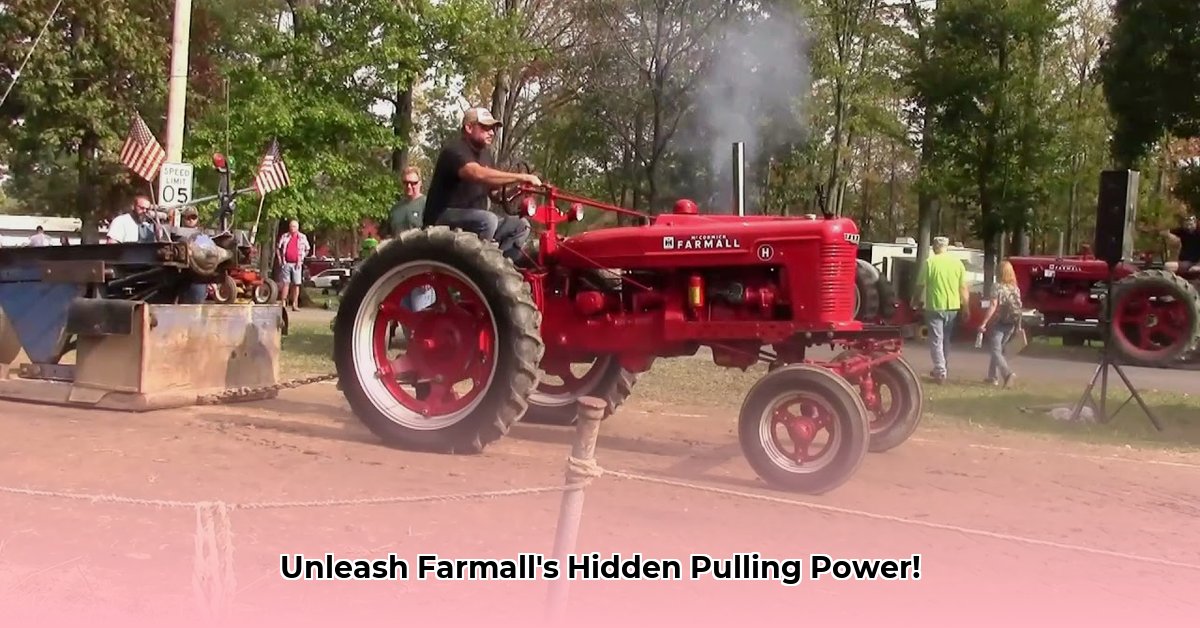
Farmall H Pulling Tractor: Unleashing its Hidden Potential
Want to transform your Farmall H into a pulling champion? This instructional guide blends practical advice with compelling narratives from the world of antique tractor pulling, focusing on strategies for lighter weight classes where the Farmall H truly shines. We’ll cover modifications, driving techniques, and risk management, helping you maximize your tractor's potential and dominate the competition. For more Farmall tractor data, check out this helpful resource: Farmall Data.
Choosing Your Battle: Weight Class Strategies
Don't pit your Farmall H against heavyweights like the Farmall M in the 5000+ pound division. It's a David versus Goliath scenario. Instead, focus on the lighter weight classes (4000-4500 lbs). Why? Because skillful driving and strategic modifications are more important than raw horsepower in these weight classes, giving your Farmall H a real chance at victory. It’s a test of finesse, not just brute force.
Making Strategic Modifications: Gaining an Edge (Responsibly!)
While preserving originality is appealing, competition demands a strategic edge. The key is understanding and abiding by the rules when making modifications. Let's explore some key areas:
Weight Distribution: Finding the Goldilocks Zone
Proper weight distribution is paramount. Too much weight in the rear leads to wheel spin; too much upfront compromises traction. "Old Man Fitzwilliam," a seasoned puller, credits precise weight placement for his success, even beating M-series tractors in his class. Experiment to find the perfect balance—not too heavy, not too light, just right.
Engine Tweaks (Within the Rules, of Course)
Higher-compression pistons and modified intake/exhaust manifolds can boost power, but proceed cautiously. Always weigh the potential for engine damage against increased performance.
| Modification | Pros | Cons |
|---|---|---|
| Higher Compression Pistons | Increased horsepower, better torque | Increased engine wear, higher risk of damage |
| Modified Intake/Exhaust Manifold | Improved airflow, better "breathing" | Potential leaks, tricky to tune properly |
| Electronic Ignition | More reliable spark, better fuel efficiency | Higher upfront cost, could still fail |
Driving Skills: The Unsung Hero of Tractor Pulling
Even with modifications, driving skill makes or breaks a pull. Master these techniques:
- Gentle Starts: Avoid aggressive starts; build speed gradually.
- Brake Mastery: Strategic braking prevents wheel slippage and maintains momentum.
- Throttle Control: Precise throttle control ensures consistent power delivery.
- Gear Selection: Utilize low gears for maximum pulling power.
Managing Risk: A Balanced Approach to Modifications
Modifying your Farmall H introduces risks. This matrix helps manage them:
| Modification | Potential Risk | Mitigation |
|---|---|---|
| Higher Compression Pistons | Engine damage, reduced engine life | Careful tuning, regular maintenance and inspections |
| Modified Intake/Exhaust Manifold | Leaks, improper fit | Professional installation, thorough checking |
| Electronic Ignition | System failure | Thorough testing, pre-competition diagnostics |
Prioritize safety! Uncontrolled modifications can lead to costly and potentially dangerous outcomes.
The Farmall H's Secret Weapon: Low-Speed Gearing
Your Farmall H’s low-speed gearing provides incredible pulling torque. Mastering this, combined with skillful driving, offers a significant advantage, even against more powerful tractors. Don't underestimate the potential of smart driving and leveraging your tractor's inherent strengths.
How to Modify a Farmall H for Competitive Pulling
Key Takeaways:
- The Farmall H thrives in lighter weight classes (4000-4500 lbs) with strategic modifications.
- Focus on maximizing traction, not just horsepower, for competitive edge.
- Careful weight distribution is essential; experiment to find the optimal balance.
- Tire pressure adjustments significantly impact traction.
- Engine modifications offer diminishing returns compared to traction improvements.
- Thoroughly understand "stock" class regulations for fair competition.
Taming the Farmall H: Weight Management for Victory
Strategic weight distribution is key in lighter weight classes. Fine-tune the balance—adding weight to the front improves steering and reduces front-wheel lift, while rear-end weight increases traction (but too much compromises steering). One puller consistently outperformed larger tractors by mastering this delicate balance, proving that finesse outweighs brute force.
Gription: The Unsung Hero of Farmall H Pulling
Maximize traction! Experiment with tire pressure (avoiding damage from under-inflation), consider pulling-specific tires (within regulations), and ensure your drawbar is correctly adjusted for optimal weight distribution.
Engine Tweaks: Small Gains, Big Effort
Engine modifications yield smaller gains compared to optimizing traction. While upgrades like electronic ignition and higher-compression pistons can increase power, they're often more costly and risky than straightforward traction improvements. Prioritize safety and fair competition.
Mastering the Art of the Pull
Smooth acceleration, precise braking, and controlled throttle management are crucial for maximizing your Farmall H's performance. Remember that success isn't guaranteed, but the camaraderie and passion within the antique tractor pulling community make the journey worthwhile.